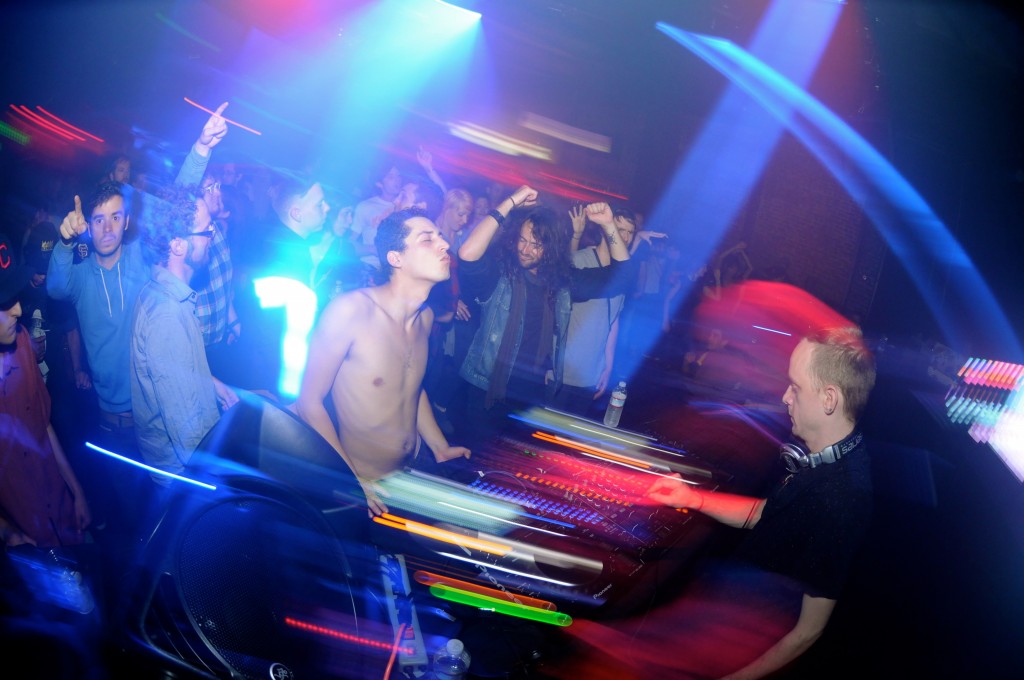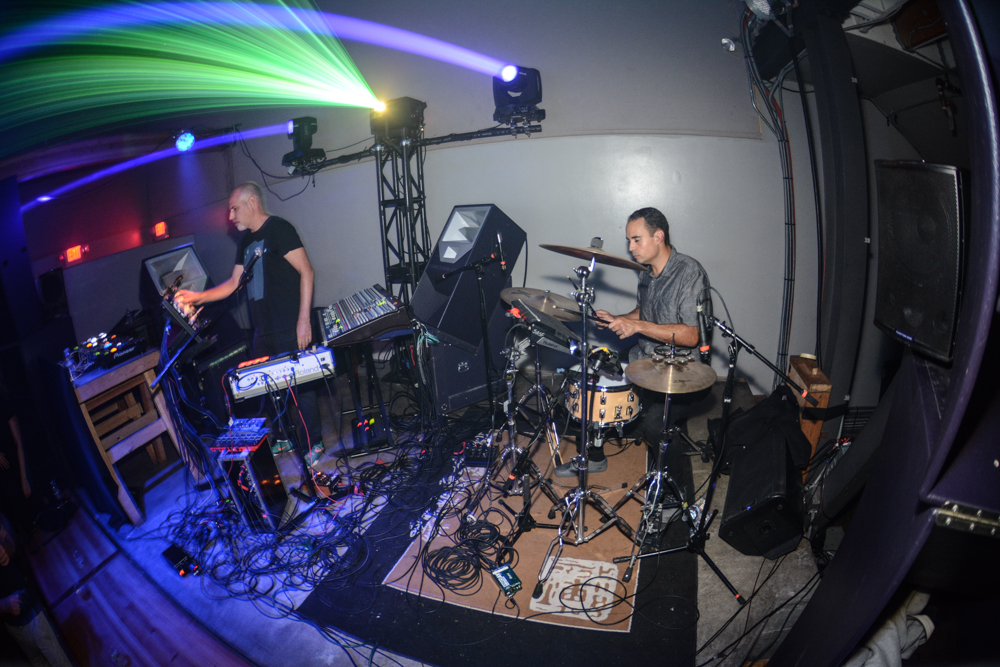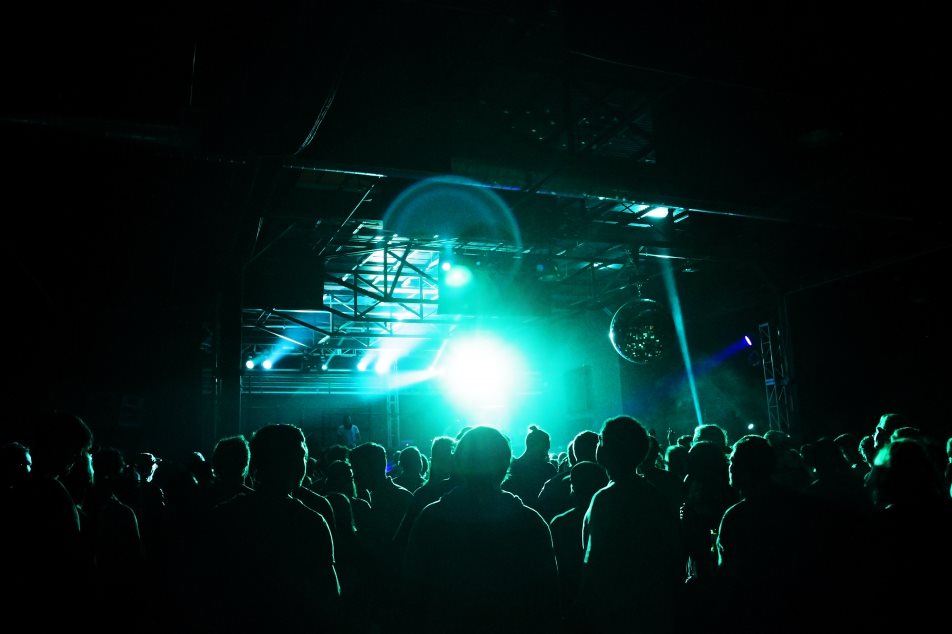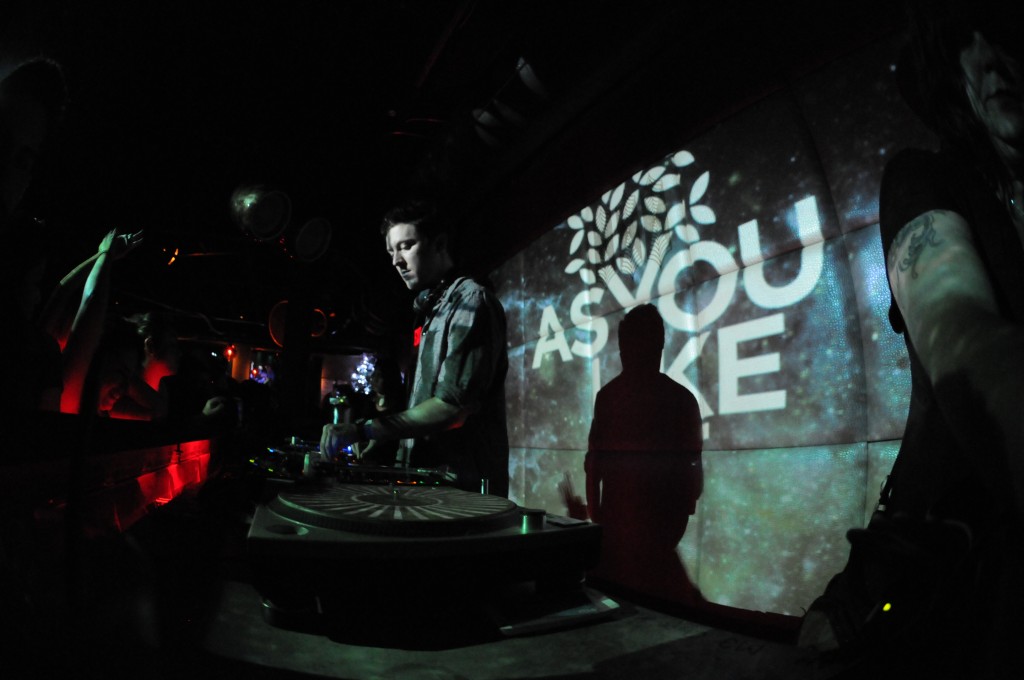As You Like It: 8 Years of Techno and Community
As You Like It (AYLI) pushes the envelope of what is possible in San Francisco’s underground music scene. The party series that started out as a new generation to SF’s changing techno landscape has grown to become a key pillar in the nightlife of the Golden Gate City. To the uninformed, AYLI is just another party night when really it is the result of years of pushing techno when the genre was on the verge of disappearing in SF. With their 8-year anniversary on the horizon they have no plans to slow down…
September 28, 2018, is the night of the AYLI 8-year anniversary. Hosted at the Midway SF, the City’s largest multifunctional club/event space, the party is set to be a grand affair for both techno and house music. Featuring a line-up that includes the likes of Nina Kraviz, Helena Hauff, Mall, Grab, Roi Perez, Perc, and Jonah Sharp aka Spacetime Continuum, attendees can expect to bounce between four rooms of music in an experience that is the closest in replicating what is commonly found in the European club scene. The production is without a doubt the biggest undertaking for the AYLI crew, who has been pushing techno in the Bay Area for years when it wasn’t always as appreciated. On the eve of their biggest celebration yet, we take the time to dive into their history with a few core members talking about techno, San Francisco, and eight plus years of parties.
To set the stage an introduction to San Francisco is in order. The 7 by 7 mile metropolis, known for its foggy weather and Victorian style homes, has been attracting people to its streets for decades. Through a historical lens its legacy takes the shape of well-known movements like hippie counterculture in the 60’s, Gay liberation in the 70’s, and currently the wave of Internet and tech companies that have brought jobs and soaring property values, but also a myriad of socio-economic issues that are not being solved. Against this backdrop, the sound and philosophy of techno, the transference of spirit from the body to the machine, feels like a fitting accompaniment to a city known for going against the grain, but that is currently being overrun by technology.
During any given month in San Francisco you can walk into a number of bars or clubs and find a group of people dancing to house or techno music. Stay in the City long enough and you will inevitably find yourself recognizing the names behind these parties. Various crews stamp their names on flyers next to guest headliners and for the informed partygoer there is opportunity to dance to techno nearly every night of the week. The scene enjoys a healthy amount of venues like Underground SF, Club OMG, and F8 that serve as a sort of proving ground for local DJs and party crews, but only a few graduate to fill out shows at SF’s larger clubs and venues. Out of those few, nobody is doing it quite like As You Like It.
From left to right: The Black Madonna, Gerd Janson & Prins Thomas, Jeff Mills, Prosumer
For a quick introduction, As You Like It is one of San Francisco’s premiere event production and techno crews taking the risk of putting together events that rival nights in much larger cities. Known for having line-ups that often feature multiple international headlining artists, the AYLI party crew and production outfit has been steadily providing San Francisco with top notch techno talent and is without doubt one of the most influential shapers of nightlife in the City. The current success and ambition of AYLI sets them apart from other techno nights, but something like this doesn’t just pop-up overnight. There had to be an origin story; one that could connect the Bay Area’s 90’s and early 2000’s rave scene with the current. To unravel the story I had to get to its roots and was lucky enough to talk to AYLI’s founder, Jeremy Bispo.
Jeremy Linden (left) & Jeremy Bispo (right)
Bispo founded AYLI in 2010, on the heels of a ripe era within San Francisco’s techno scene and as with any great story from the underground, this one starts on the dance floor. “I found my people in the parties…you start as a dancer then often become a DJ and then it’s the next step and the next step,” says Jeremy Bispo over the phone. “For me, I was immediately involved in the production of parties. It was only a few months in that I was volunteering to work door shifts or help with cleanup and set-up. I was living in Monterrey and making trips to the Bay Area and it’s hard to put into words, but it felt like such a natural progression for me to contribute. I immediately felt a calling to offer services, to do more.”
As much now as then, Bispo and AYLI have become synonymous with inspired bookings, often pairing a headlining DJ with homegrown local talent. Bispo’s knack for selecting line-ups cannot be underrated. Two years ago Boiler Room recorded The Black Madonna b2b with Mike Servito at Dekmantel. Since then it has garnered over 1 million views making it one of Boiler Room’s most viewed sets. In the introduction to that video the MC announces their back-to-back set, noting these two have only played together three or four times before. The first time? It was at an AYLI party put together by Jeremy Bispo.
That’s right, the phenomenon that is The Black Madonna b2b Mike Servito was birthed in San Francisco. AYLI recorded that historical four and a half hour set and released it as AYLI Podcast #50. When it released, it went on to be Resident Advisor’s Mix of the Day and continues to be AYLI’s most viewed Podcast on Soundcloud.
Originally hailing from Monterrey, Bispo’s love for techno emerged early on, throwing his first party when he was just 19 years old. Now a Bay Area resident for over 20 years, Bispo has been throwing parties for just as long and arrived in time to experience the first wave of techno parties in the Bay. After a brief hiatus in Minnesota, Bispo returned to the Bay Area in 2008 to a changed scene, “I didn’t fully grasp how much the City had changed,” he reminisces. “I was a close friend with Greg Bird, the only non-DJ in the Kontrol parties, which was at one point the best techno party in San Francisco that launched out of the minimal scene in the early-mid 2000’s. I remember him telling me about their launch while I was in Minnesota. Also while I was gone Dirtybird had launched. Sunset [Sound System] tapped into that next generation because they had a strong relationship with [Dirtybird] and you could see the sounds change.”
The venues were different too. A once thriving venue called The Compound, out in Hunter’s Point, used to be a hub for techno. The Compound sadly closed in 2011 after being an underground staple for art and music since the 80’s. It was at Bay Area venues like this that AYLI first manifested, not to mention spaces in Oakland that once supported large underground events. One of those events in Oakland featured the first renderings of AYLI with the original billing stating, “ASR presents As You Like It.” One of the attendees at that party was Jeremy Linden, the future Director of Operations for AYLI. “I originally came to see Robert Hood and that’s when I met [Jeremy] Bispo,” he tells me. “Soon after that I started working the door at a few parties and our working relationship evolved from there.”
Linden grew up in Detroit, the birthplace of techno, before finding his way out to California for work. As someone who came from a city with a deeper history in techno than San Francisco, I wanted to ask him about his perspective on the ethos behind an AYLI event and the community in the City. For Linden, it’s more about the continued appreciation than any hope of striking it big. “No one gets into this business to make a lot of money. No one gets into house and techno to get rich,” he tells me on the phone. “The people [in San Francisco] are appreciative of the work that people put in; more or less they know that it’s not to get rich.” I pressed him further to find out his thoughts on competition within San Francisco’s network of house and techno parties. His response was in large, appreciative, “It’s competitive, but it’s not cutthroat. I’ve heard stories about the NYC/LA scene and I don’t think that happens here. It’s more about pumping up each other rather than tearing each other down. No one would call the cops on someone else’s party. It’s not the spirit of SF.”
Also present at those early parties at The Compound was AYLI resident Christina Chatfield. For those who may not know, Christina is one of the original AYLI residents and the only resident to perform live sets. Originally from Dayton, Ohio and a graduate of the prestigious Berklee College of Music, Christina took her studies in Music Synthesis and applied them to her love for electronic music. She performed for AYLI after meeting Jeremy Bispo through the rave scene in the late 2000’s. It was only the second time she had ever performed live. When I mentioned The Compound she had fond memories, “[The Compound] was a hidden gem in a pretty remote location that made you question whether you were at the right spot. The room was circular and most times the artist played in the middle. One of the coolest things was that you could hear your music the same way as the audience could and events could go super late into the night.”
Each of Christina’s live sets takes a lot of preparation, which means she only performs for AYLI around four times a year. In between, she has managed to keep a busy schedule touring much of the United States including NYC, Chicago, Philadelphia, Detroit, and Minneapolis (which she says has a great scene). I should also mention that she manages to hold down a full-time job as well.
Despite aspiring to doing music full-time, like many artists in the Bay Area Christina recognizes the hardships of that decision, “One of the challenging things about living in the Bay Area is that it is difficult to be an artist. Doing the whole artist lifestyle is not really possible unless you maybe have rent control.” In fact, out of all four members of AYLI that I talked to, nobody could afford to do it full-time. When I spoke to Jeremy Bispo he understood this as well as anyone, “AYLI is a space for creativity to thrive and artists to blossom. It’s really hard to live here and be an artist so someone needs to facilitate that,” he emphasized. “If not us then who?”
The Compound would also play host to AYLI as they brought a then 20 year Nicholas Jaar out for his San Francisco debut, a perfect example of Bispo’s knack for keeping line-ups fresh and on the cutting edge. AYLI also has to be credited with the SF debuts of Peter van Hoesen, Maya Jane Coles, Floorplan (live set), Tiger & Woods, DJ Qu, Sandwell District, and more. I was wondering about what interacting with these high caliber artists was like and was able to speak to the perfect source, William Wardlaw.
AYLI resident Christina Chatfield
William keeps a lower profile than some of his AYLI peers. Although he DJs around the Bay Area for nights like WERD and Housepitality, he is not listed as an AYLI resident. Instead William does his work for AYLI behind the scenes, namely by chaperoning visiting artists when they arrive in San Francisco and ensuring they are comfortable enough to perform at their best. Like Jeremy Linden and Christina Chatfield, William also met Bispo at the Kontrol and WERD parties around the time AYLI was beginning and volunteered to help with artist transportation and hospitality, starting with working a party that headlined No Regular Play. In addition to artist hospitality, he also does the recordings for AYLI parties and manages its podcast series. If you tune into an AYLI podcast you will hear William’s voice and Moog in the introduction.
In his position, William has the opportunity to interact with A-level talent and even form lasting friendships with the artists. An interview by Chris Zaldua for the AYLI podcast series is posted on the AYLI website. In it, William shares some pretty incredible stories. My favorite being the following:
“It’s always fun going out to a late night diner after a gig if the artists wants to eat before going back to the hotel, which I’ve done with people like Levon Vincent or Prins Thomas. It’s great when artists return regularly, because now spending time with Maya Jane Coles, Peggy Gou, or The Black Madonna seems like catching up with a friend. When Session Victim played live for AYLI the first time Matthias Reiling played my bass, which was wild because they’re one of my favorites. Talking with Kerri Chandler about his love of space and NASA I’ll never forget. I love how many of the artists at the top of their game are genuinely nice people, from Ben UFO, Midland, Move D, Jus-Ed, Axel Boman, Gerd Janson, or Ben Klock.”
Kerri Chandler
Session Victim
Nicolas Jaar
When I talk to William on the phone I ask him about the perception these visiting international artists have about the underground scene in San Francisco. He tells me that for the most part they are uninformed if they haven’t been to the City before. When he tells me he sometimes has to brief DJs to expect a smaller crowd size, I am not surprised. After all, for all of the small parties that make the SF scene strong there isn’t an equivalent to major venues like Berghain or Tresor in Berlin or De School Amsterdam. More than the size of the crowd is the 2 AM curfew for alcohol sales. “It definitely catches some of the [DJs] by surprise and you have to kind of temper expectations,” William tells me over the phone. “People tend to leave after 2 AM even if we keep the party going till 4 AM. Ben Klock thought this was weird when I explained it to him. He didn’t understand why the crowd wouldn’t want to stay even without being able to drink.”
It’s a sentiment not lost among the local scene. For any who have made the pilgrimage to Europe they will know it is commonplace to have clubs run until late morning. Nightlife is taken more seriously across the pond. Serious enough for governments to appoint Night Czar’s that can advocate for nighttime culture and the economy it brings to cities. California doesn’t have anything close to this kind of engagement from government. The existence of the 2 AM alcohol curfew is a serious limitation on the Bay Area’s ability to grow culturally and economically. Clubs that operate past the hours when they can sell drinks are basically eating 100% of the costs to stay open during that time. Parties that do manage to go past 2 AM usually do so on good faith with the venue. It’s a severe handicap to promoters in terms of selling tickets and the risk they take in guaranteeing a bar minimum, which sometimes can result in promoters being hundreds of dollars in the red on a bad night.
Still, even with an archaic alcohol curfew the availability of venues is something to be thankful for. There is no doubt that after going to the same venues month after month you may start finding something to complain about, but at least they are open. As I found out, this wasn’t always the case in San Francisco. “Early on it felt like SF had no venues,” recalls Christina Chatfield. “Underground spaces and clubs were closing and the city was suffocating the scene.
Great Northern
But after a few years with Public Works and the Great Northern opening it started to rebuild.” Jeremy Bispo is also grateful for these venues, but realizes there may be a new problem, “We’re at a point where we have a lot venues, but not a lot of people going out.” To put that into perspective, just compare San Francisco’s modest population of 870,887 people to larger urban areas like Los Angeles (population 3.9 million) or New York City (population 8.5 million) and Bispo’s point is well made.
Despite its challenges, it certainly doesn’t feel like the Bay Area’s underground dance scene is in any danger of fizzling out. The sentiment echoed across the members of AYLI as the date for their anniversary approaches is one of optimism and determination. “It has been awesome to be part of a growing techno scene,” is the sentiment Christina Chatfield expressed to me. William Wardlaw was equally as appreciative telling me, “Those lights aren’t going out anytime soon.” Bispo agreed, “It feels good to see people doing things."
Perhaps hoping to avoid a jinx, Bispo also had to hold some reservations, “It’s hard to know where the scene is at right now. There used to be 10,000 people parties in the East Bay with international artists. You definitely don’t find that anymore.” Still, he is not going to stop doing what he and AYLI have been doing for 8 years now. “I’ll keep doing this until I no longer feel the energy at 2 AM. With the current scene, I’m definitely feeling a new rush of energy, “ says a grateful Jeremy Bispo at the end of our conversation. “The hard work from people like Brouhaha, Honey Soundsystem, or Sunset [Sound System] is appreciated by the community.” From the tone in his voice I could tell it was appreciated by him as well and that his love for the techno community ran deeper than he was able to express in just words. When I asked him what he hopes his legacy will be he politely downplayed nearly 20 years of creating community on the dance floor. “I’m just one voice doing the best that I can," he told me earnestly.
If anything, AYLI is not just a party. It is a current reminder of San Francisco’s history as a city of trailblazers and rebels. It is a testament to techno being a positive cultural force in the Bay Area. Most importantly, it is proof that the Bay Area needs nightlife culture and that building a scene only happens with exceptional dedication and time. September 28, 2018 at the Midway SF, the culmination of all that AYLI represents will be on display for you to see. So, in anticipation of a night to remember, here’s to 8 years of AYLI; 8 years of techno and community. For all the dancers, this will certainly be something worth celebrating.





Credits:
Written by Brennan Ko-Madden
Design/Graphics by Patrick Lotilla
Cover Photo by Bailey Greenwood
AYLI Event Photography by Shanna Doherty
Additional Photography by Brennan Ko-Madden, Christopher Soltis, Bailey Greenwood, & Pulse Generator






















